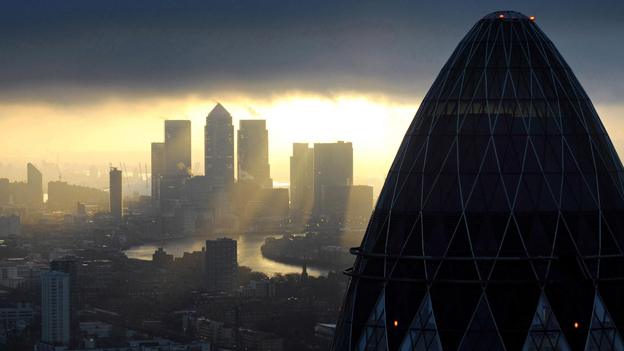Half a cheer for depression's end
- Published
- comments

On Friday we will have - depending on how you look at it - either the most symbolically important or the most pointless economic event of recent times.
Namely, official confirmation that the depression caused by the mother of all banking and financial crises is finally over. UK output or GDP has finally exceeded its pre-recession peak (the technical definition of a depression is the period during which GDP remains below that peak).
On the official government stats, GDP fell by 7.2% between its peak in the first quarter of 2008 and its trough in the second quarter of 2009.
Since then recovery has been unusually - some would say lamentably - slow, and national output in the first three months of this year was still 0.6% below that peak.
But that recovery has been picking up considerable momentum over the past year. The UK is now the fastest growing economy of all the world's rich ones.
So in the quarter to the end of June, quarter-on-quarter growth is bound to have been more than 0.6%. The respected National Institute for Economic and Social Research predicts growth of 0.9% in that period.
Which means - hooray hooray hooray - that the depression is officially over, and that we are now once again earning more than we did before the banks got us into our pretty pickle by starving us of credit.
All of which is terribly exciting. And we can expect the Tory chancellor, George Osborne, and his Lib Dem treasury chief secretary, Danny Alexander, to shout from the rooftops that this economic renaissance is all down to their sagacity and tough actions.
Except, as is usually the way with blinkin' economic statistics, it isn't quite as straightforward as that.
For one thing, the Office for National Statistics is in the process of reworking how it calculates GDP. And it has already admitted that the number I gave you above, about how far output fell from its peak between 2008 and 2009, is wrong.
The current officially recorded contraction of GDP exaggerates, a bit, the magnitude of the decline in output. Which implies that the previous peak for output was almost certainly surpassed some time ago - so long, that is, as there aren't significant offsetting revisions to subsequent growth.
Chances are, however, that this terrible depression actually ended some while ago, probably last year. Fingers crossed we will know more about this - I won't say the truth of it (nebulous concept in economics) - in September.
So on Friday we will basically be doing the equivalent of celebrating a World Cup victory that may or may not have actually happened some months earlier.
This could only happen in the wonderful world of economics.
Which brings me to my second and third reasons why you may not need to put out the "Britain is booming again" bunting on Friday.
For one thing, the industrial experience of the past few years has been variegated.
So we are certain that the service industries, which dominate our economy, are already producing more than they did before the great crash, whereas manufacturing is still generating considerably less - 7.6% less in the first quarter of this year, on those questionable official figures.
The vaunted rebalancing of the economy between intangible services and tangible making has not remotely happened - and probably never will.
Perhaps more importantly, it is very unlikely that you personally - yes, I am talking to you - feel any richer than you did at the beginning of 2008.
Because whichever way you cut it, most people remain poorer, largely because the population has increased considerably faster than output has recovered.

Despite the upturn, "most people remain poorer"
How much poorer?
Well the acknowledged brainboxes on this are the Institute for Fiscal Studies.
And they say that a year ago real median income - that is adjusted for the impact of inflation - was still 5.8% below its peak for a typical individual (the median calculation) or 8.5% lower on average (the mean assessment).
There are various other ways of cutting these figures, according to which measure of inflation is used or whether housing costs are incorporated.
But the relevant point is that living standards for most British people haven't yet recovered to their pre-crisis levels - and probably won't for two or three years yet.